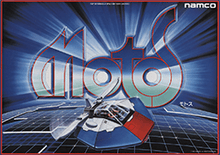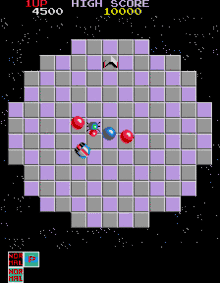Motos
Motos (モトス, Motosu) is an arcade game that was released by Namco on September 20, 1985.[1] It runs on Namco Super Pac-Man hardware but with a video system like that used in Mappy, The Tower of Druaga, Grobda (without the DAC) and Dig Dug II.
| Motos | |
|---|---|
 Arcade flyer | |
| Developer(s) | Namco Dempa Mastertronic |
| Publisher(s) |
|
| Platform(s) | Arcade, Amstrad CPC, Commodore 64, X68000, ZX Spectrum, iOS, Android |
| Release | Arcade
|
| Genre(s) | Action |
| Mode(s) | Up to 2 players, alternating turns |
| Cabinet | Upright, cabaret, and cocktail |
| Arcade system | Namco Super Pac-Man |
| CPU | 2x Motorola M6809 @ 1.536 MHz |
| Sound | 1x Namco WSG @ 1.536 MHz |
| Display | Vertical orientation, Raster, 224 x 288 resolution |
Gameplay
The player must take control of the eponymous Motos, a bumper car whose goal is to force enemies over the edge of the playfield by bumping up against them; however, all the enemies are capable of doing exactly the same thing to it. "Power parts" and "jump parts" can also be collected during the 62 rounds, which will give Motos extra bumping power and the ability to jump over gaps in the playfield.
Characters

- Motos: This bumper car is the protagonist of the game. Its only goal is to bump every enemy off the edges of one playfield in order to proceed to the next one.
- Power and Jump Parts: These can be found on some of the playfields. When you collect one, it will be displayed at the bottom-left corner of the screen; Power Parts will give Motos extra bumping power, and up to seven of them can be used at the start of a round. However, Jump Parts will give Motos the ability to jump over the gaps in some of the playfields, along with the ability to crack and destroy their tiles when it lands upon them - but only one of them can be used at the start of a round. (If Motos takes too long over any round, projectiles will come flying towards the tiles and destroy them).
- Red Pupas: These red spheres weigh in at 380 kg (836 lb), have a top speed of 20 km/h (12 mph), are worth 300 points when forced off the edge of a playfield, and appear on the first, third, fourth, sixth, tenth, eleventh, fifteenth, sixteenth, twenty-sixth, twenty-eighth, fiftieth and fifty-third rounds of the game.
- Blue Pupas: These blue spheres weigh in at 380 kg (836 lb), have a top speed of 20 km/h (12 mph), are worth 300 points when forced off the edge of playfield, and appear on the second, third, fourth, eleventh, twenty-sixth, twenty-eighth, fiftieth, fifty-first and fifty-third rounds of the game.
- Black Pupas: These black spheres weigh in at 400 kg (880 lb), have a top speed of 20 km/h (12 mph), are worth 300 points when forced off the edge of playfield, and appear on the eighteenth, twentieth, twenty-second, forty-fifth, fiftieth, fifty-third, fifty-seventh, and sixtieth rounds of the game.
- Polars: These black magnets weigh in at 400 kg (880 lb), have a top speed of 20 km/h (12 mph), are worth 800 points when forced off the edge of playfield, and appear on the second, fifth, sixth, thirtieth and thirty-fourth rounds of the game.
- Spiruses: These blue-bodied, red-headed insects weigh in at 2900 kg (3.19 tons), have a top speed of 40 km/h (24 mph), are worth 1000 points when forced off the edge of playfield, and appear on fourth, eighth and twelfth rounds of the game.
- Fire Bugs: These big red-eyed insects weigh in at 3800 kg (4.18 tons), have a top speed of 45 km/h (27 mph), are worth 1300 points when forced off the edge of a playfield, and will appear on the seventh, twenty-first, thirty-sixth, forty-second, forty-fourth, forty-seventh, and fifty-second rounds of the game.
- Fire Bees: These big blue-eyed, winged insects weigh in at 3200 kg (3.52 tons), have a top speed of 70 km/h (42 mph), are worth 1500 points when forced off the edge of a playfield, and appear on the thirteenth, twenty-third, twenty-seventh, thirty-eighth, forty-first, forty-sixth, fifty-second, and fifty-seventh rounds of the game.
- Taitorians: These small, red-eyed insects weigh in at 4100 kg (4.51 tons), have a top speed of 55 km/h (33 mph), are worth 2000 points when forced off the edge of a playfield, have no connection to the Taito Corporation, and appear on the eleventh, fourteenth, sixteenth, twenty-fifth and twenty-eighth rounds of the game.
- Lady Bugs: These small, blue-eyed insects weigh in at 5120 kg (5.64 tons), have a top speed of 60 km/h (36 mph), are worth 2500 points when forced off the edge of a playfield, and appear on the seventeenth, twenty-second, thirty-second, thirty-eighth, fortieth, forty-third, forty-ninth, fifty-second, fifty-sixth, fifty-seventh and fifty-eighth rounds of the game.
- Beetles: These black-shelled, yellow-lined insects weigh in at 5800 kg (6.38 tons), have a top speed of 55 km/h (33 mph), are worth 3000 points when forced off the edge of a playfield, and appear on the eighteenth, thirty-first, fifty-first, fifty-fourth, fifty-seventh, fifty-eighth and sixty-first rounds of the game.
- Megas: These enormous red-and-gray spheres weigh in at 7500 kg (8.25 tons), have a top speed of 10 km/h (6 mph), are worth 3500 points when forced off the edge of a playfield, and appear on the ninth, nineteenth, twenty-fourth, thirty-third, thirty-fifth, thirty-seventh, and thirty-ninth rounds of game.
- Gigas: These enormous black-and-blue spheres weigh in at 13400 kg (14.74 tons), have a top speed of 20 km/h (12 mph), are worth 5000 points when forced off the edge of a playfield, and appear on the twenty-ninth, thirty-ninth, forty-fourth, forty-eighth, forty-ninth, fifty-ninth, sixty-first and sixty-second rounds of the game.
- Nabicons: These enormous gray generators appear upon the third, ninth, sixteenth, nineteenth, twenty-fifth, twenty-sixth, twenty-ninth, thirty-fourth, thirty-ninth, forty-second, forty-third, forty-fourth, and sixty-first rounds of the game, and will release Blue Pupas at regular intervals. They cannot be moved by bumping against them, and the only way to force them off the playfield for 50000 points is to continuously bump them until they explode.
- Beecons: These small, gray, red-lined diamonds sit in place doing absolutely nothing until Motos forces them off the edges of the playfield for 1000 points.
Ports
The game was ported to the Commodore 64, Amstrad CPC, and ZX Spectrum, and was also released in 1998 as part of Microsoft Revenge of Arcade for Windows PCs - the first known appearance of the arcade version in North America. More recently, the game was released in 2005 as part of Namco Museum Battle Collection for the PlayStation Portable, as well as Namco Museum Virtual Arcade for the Xbox 360 on November 4, 2008. The game is also present in two Namco Museum compilations that were originally released exclusively in Japan: Namco Museum Encore for the PlayStation, in 1997, and Namco Museum Volume 2 for the PlayStation Portable, in 2006. The latter also features an updated "Arrangement" version of the game (made in the spirit of the 6 original "Arrangements") with 3D graphics.
A "remixed" version of the game featuring Namco's signature character, Pac-Man, was released as part of Namco Museum Remix under the name of Pac-Motos - and Namco Museum Megamix also included the original game along with the remix.
Reception
In Japan, Game Machine listed Motos on their October 15, 1985 issue as being the fifth most-successful table arcade unit of the year.[2]
References
- Motos at MamEnd
- "Game Machine's Best Hit Games 25 - テーブル型TVゲーム機 (Table Videos)". Game Machine (in Japanese). No. 270. Amusement Press, Inc. 15 October 1985. p. 25.
External links
- Motos at the Killer List of Videogames
- Motos at the Arcade History database